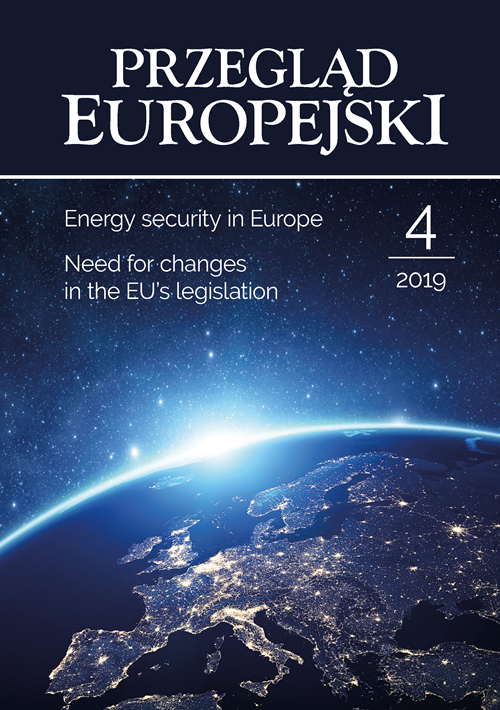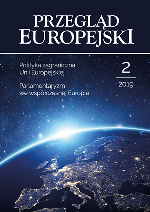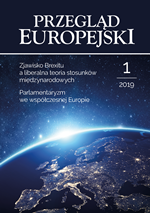
We kindly inform you that, as long as the subject affiliation of our 300.000+ articles is in progress, you might get unsufficient or no results on your third level or second level search. In this case, please broaden your search criteria.


The aim of this article is to propose an analytical framework of the EU as a laboratory of paradiplomacy in context of international and domestic determinants of the regions’ foreign activities. The article shades some light on the definitions of paradyplomacy, which allow to understand the ambiguity of the status of regions in international relations. Firstly, the dimensions and types of paradiplomacy are identified. Secondly, the discourse concerning international and domestic determinants of international engagement of regional governments is identified. Then, the framework of the EU as a laboratory of paradiplomacy is explained in the three subsequent parts. Firstly, the EU is referred to as an intermestic determinant of paradiplomacy, what results from the specific nature of the EU that corresponds with the international and domestic determinants of paradiplomacy in general. Secondly, the EU is addressed as an arena of paradiplomacy where various patterns of regional governments’ presence in Brussels are tested. Finally, paradiplomacy in the EU is addressed as a scholarly challenge for the further research.
More...
The purpose of the article is to try to outline whether the EU is still an attractive actor in internationalrelations, which is conceptualised as a specific soft, normative and the same transformative powerand the centre of attraction for states located outside this organisation. The credibility of the European Union on international arena was undermined by global changes taking place in the 21st century,including emergence of new non-European powers, and particularly a series of crises (financial,migration, identity) that have affected the EU recently. In the article the following analysis will bemade: the basic components consisting of attractiveness of the EU and evolution of its perceptionon the international arena, and the main challenges that the EU has to cope with in order to becomea significant power again. It is assumed that the European Union certainly lost its attractiveness andprestige as a result of recent transformations that affected it within the system, but also due to thedynamics of the international environment.
More...
The article explores the potential for new research into issues of state non-conformity as a result ofincreasing euro-skepticism in Europe. Relying on the Polish example, it suggests that a new attitudetowards the EU has arisen which escapes traditional classifications and warrants a rethinking ofestablished theories on sources of non-compliance. This attitude gives new context to the Commission’s existing enforcement practice and calls for a fresh look at its compliance instruments not onlywith respect to infringement cases but also in its dispute with Poland over the rule of law principlewhere the conduct of both parties seems to be symptomatic of their more general approaches.
More...
Hate speech has become a key element of contemporary political discourse. It has also changedthe very structure of communication. With the access to public sphere provided by social media,hate speech engages people in connective action, which allows it to construct and deconstructcollective identity. By doing this, hate speech undermines the idea of multicultural society. In orderto succeed, such a society needs to engage its members in inclusive intercultural dialogue whilehate speech strongly excludes all dissident voices, deepening political polarisation. This articlepresents an extensive analysis of hate speech from the perspective of intercultural communication.Drawing from available research and literature, the author puts forward the thesis that hate speechis a communicative phenomenon that not only disrupts intercultural dialogue, but also leads to thedisintegration of multicultural society
More...
This article elaborates the influence of sports and music on the diplomatic position of Kosovo.Despite being a new country and struggling with political recognition and diplomatic relations,Kosovo has gained popularity through the global success of its citizens in sports and music.An analysis of international media has shown that there is a significant correlation between thesuccess of individuals in changing diplomatic approaches towards Kosovo and redefinitionof constraints towards its citizens. Moreover, the image of a country built through success stories ofindividuals has a significant effect on the general international public and has changed the negativeperception of the country. Kosovo here is used as an example to illustrate how sports and culturaldiplomacy have been more successful than classical diplomacy
More...

The article describes the features of the 4.0 economy which are linked to the so-called ‘cancer stage capitalism’, and which influence the directions of development of European industrial relations. This extensive research area has been reduced to those elements of transformations associated with the progress of the 4.0 economy that undermine or invalidate the existing ‘regimes’, developed so far in the framework of certain ‘matters’, including public affairs, industrial relations and social dialogue.
More...
The aim of this article is to reconstruct links between Union’s legislative power and foreign policyof the European Union. Presented analysis focuses on legal aspects of that issue. The hypothesis ofthe article assumes that even though the range of legal links between EU’s legislative institutionsand the realm of Union’s foreign policy is wide, these institutions within the policy in question onlyto a limited extent perform legislative function as defined by treaties and understood as law-making in accordance with particular (marked with certain standard of transparency and democraticlegitimization) treaty procedure. The verification of this hypothesis is based on a dogmatic-legalmethod and requires the analysis concerning the nature of Union’s foreign policy, the identificationof Union’s legislative institutions (organs) and functions and the legal links between them and theUnion’s foreign policy.
More...
The article presents the outcomes of the research concerned the issue of the European Union’s foreign economic policy, as well as its models and instruments. The EU applies various approaches inrelations with third countries, that is determined by differences in aims it intends to achieve in everyspecific case. The EU acquis constitutes only general framework of the European Union’s foreigneconomic policy, that results in disorderliness and incoherence of European Union in relations withthird countries. The Author identified key determinants, that actually shape current models of theEuropean Union’s foreign economic policy towards various groups of states. Significant problemsand failures have been found. Analysis carried out in the article leads to the conclusion that currentmodels and instruments of foreign economic policy, used by the EU, are not sufficiently efficient and often do not allow to meet new challenges effectively. New approaches and solutions have beenproposed by the Author can help to improve the foreign economic policy of the EU and to adjust itto the contemporary global challenges.
More...
Russian intervention in Donbas and annexation of Crimea have triggered a fundamental revision ofthe EU policy towards Easter neighbourhood and Russia. The main goal of this paper is to developdiscussion about the EU strategy towards Russia by presenting political concept named “The Giedroyc doctrine”, created by Polish intellectuals on exile, when Poland was under Soviet domination.Although created a few decades ago, some elements of this doctrine are still surprisingly relevanttoday and may contribute to contemporary European debate. In particular, we argue that strengthening the prosperity, stability and security in Eastern Europe is possible only when Russia transformsitself into a prosperous and democratic state. Autocratic and neo-imperial Russia undermines anymajor pro-Western political changes in the region. Therefore, successful transformation of Russiainto stable, prosperous and democratic state should be included into the long-term vision of European politicians who intend to keep Europe secure. All political activities in the Eastern neighbourhood should be subordinated to this. It means that economic support for Ukraine and strengtheningcooperation with this country should not be a goal itself. Westernization of Ukraine ought to beperceived only as a beginning of political transformation of the whole region.
More...
Main argument raised against EU early warning mechanism is its low utility. Yellow card procedure has been launched three times so far, whereas orange card procedure not even once. Thisindicates that the potential of political instrument which is early-warning mechanism is not fullyexplored. Nonetheless after seven years since the Lisbon Treaty came into force we can collectenough data in order to asses not only the mechanism itself but also the influence of this instrumenton the national parliament scrutiny and engagement in the EU affairs. The aim of this article is: toresearch how the Sejm and Senate use the early warning mechanism, describe what is its impacton general competences of the Polish parliament regarding subsidiarity control and to confront this assessment with the activity of other national parliaments. Thus, the author will propose theset of indicators according to which will be possible to evaluate the activity and eventually theeffectiveness of national parliaments while using the early warning mechanism. There will be alsopresented the results of the empirical study measuring the activity of Sejm and Senate in mentionedarea in the years 2010-2016.
More...
The article’s goal is to present the consequences of Polish membership in the European Union (EU) forthe functioning of the Polish Sejm and Senate at the national and international level. Polish accession tothe European Union resulted in changes to the scope of competences of certain organs of the Republicof Poland. This was related to the transfer of specific state competences to an international organizationand it applied, in particular, to the Polish Parliament (the Sejm and Senate) which has lost its primary roleas legislator of laws applicable in Poland. In order to avoid the marginalization of national parliamentsin the EU decision-making process, appropriate legal measures have been introduced at the nationaland international level. Additionally, after the Treaty of Lisbon entered into force, national parliamentshave received new competences which allowed them to exist on the forum of the European Union. Thearticle puts forward the thesis that the Polish Sejm and Senate have lost their position as main legislativebodies at the national level but, at the same time, they have acquired a new European function whichcan neither be qualified as traditionally understood legislative nor controlling functions.
More...
The article is dedicated to the subject of the parliamentary faction in the Verkhovna Rada of Ukraine.The author describes the form of organization of members of the Ukrainian parliament, the historyof the regulation, the political goals of the amendments and the parliamentary practice. The articletries to point a regulation which mark the Ukraine out in the other states: such as constitutionallevel of the provisions alongside parliaments’ internal rules of procedure, criterion for formation ofassociations of members of parliaments, the principle of autonomy, the essence of party disciplineand a specific solution intended to reduce the problem of members of fractions leaving them duringthe term of the parliament.
More...
The author analyses a problem of the genesis and evolution of the Faroe Islands’ aspiration for broadening the scope of the given autonomy. The Faroe Islands are dependent territory of the Kingdomof Denmark. The autonomy has had a long parliamentary tradition, as well as homogenous societyaspiring to be recognised as a separate nation. Increasing the scope of a given autonomy was donein evolutionary and peaceful way with full respect to democracy and the rule of law. The FaroeIslands indicates the aspirations towards gaining the independence. Tendencies connected withEuropeanisation and globalisation play a special role in the process. Still an unsolved issue, whichmay be an obstacle on the way to gain independence, remains the financial independence of theautonomy
More...
This article aims to analyze the statements published by Polish MPs about the situation of migrantsin a social media platform, Twitter. The results of the study show that politicians rarely raise thesubject of migration, although a number of important events took place in the international arenaregarding the problems of migrants from war-torn areas. Parliamentarians’ tweets are characterizedby brevity and generality. They focus on informing about the risks associated with accepting migrants from war-torn areas. A large number of tweets is an appeal for humanitarian aid for migrants. Some posts refer to the chances of development of the Polish economy as a result of economicmigration. Parliamentarians’ statements correlate with political, social and psychological factors thatare influenced by the complexity of the subject of migration, polarization of public opinion and theexistence of stereotypes and prejudice against migrants.
More...

Hereby paper is dedicated to the issue of Brexit in the context of liberal theory of international relations, mainly by adoption of the qualitative method of textual examination of selected works, devoted to the abovementioned paradigm. The hypothesis of this article is a statement that liberal approach has a limited applicability to description of community disintegration mechanisms, including Brexit as their unquestionable syndrome. Existing theories of European integration, of which liberalism is one of the most influential theoretical schemes, reveal several malfunctions in exploration of Union’s decomposition processes, however, on the other hand, some of their specific components still remain valid. The above issue exposes a demand for investigating new tools and researching methods to scrutinize current trends in the European Union that would allow to review the present state of this organization in a more adequate manner.
More...
The paper is devoted to the method of voting, which is typical for the British Parliament. This method is referred to as “division”, because both Members of Parliament (MPs) and Lords are literally divided into two groups – supporters and opponents of the issue being voted – and cast their vote in special rooms called division lobbies. The author presents the process of such “division” and explains some additional issues related to voting and the rules that are used to determine its final results. The paper also describes successful and failed attempts to change this system that took place at the turn of the 20th and 21st centuries. Using legal and institutional analysis method, the author explains why this system is so persistent, and proves the thesis that despite some minor modifications that have been made to it, one should not expect it to be replaced by some form of electronic voting.
More...
The article presents the issues of the political position of the parliament in one of the largest statesof the South Pacific subregion – Papua New Guinea. Shaping its legal and political system, the stateprofoundly derived from the British practice. This process was initiated in the first decade of the 20thcentury as a result of Australian rule, which had lasted by that time the state gained its independencein 1975. As a consequence, all the basic features of Westminster democracy were adopted, with theunitary form of government and the unicameral parliament. The analysis allowed to indicate that thecharacter of Papuan democracy has evolved over the years, and therefore some elements of theWestminster model have become inadequate and not very effective. These changes concerned mainly superior state structures, including the parliament. It is a body increasingly controlled by theexecutive nowadays, that lost its original representative character. In this article, the author has adopted the following research methods: an analysis of legal sources and a critical analysis as well asa descriptive method. The text was divided into three main parts, the introduction and the conclusion.
More...